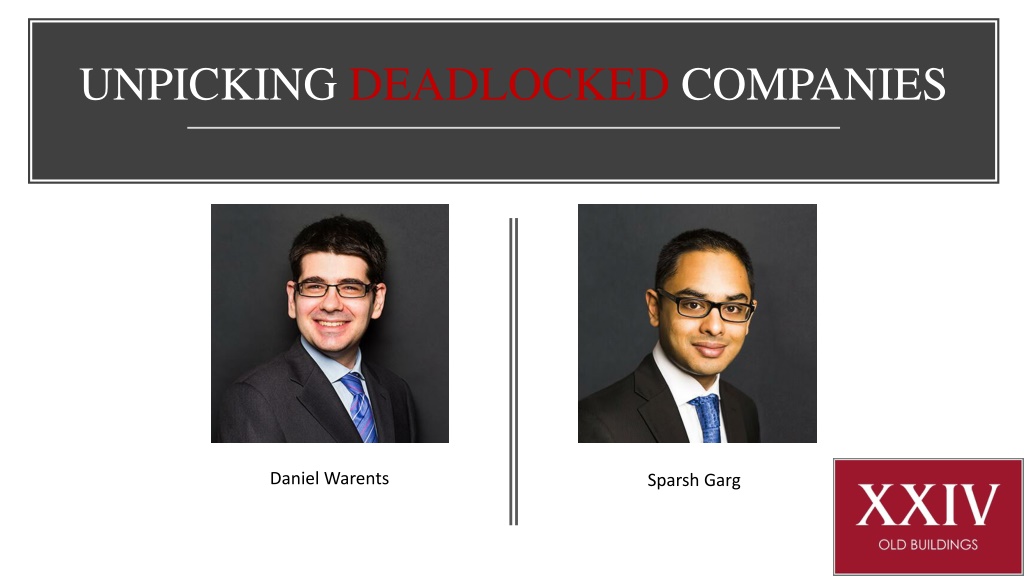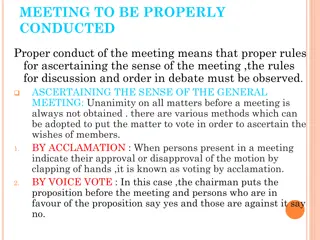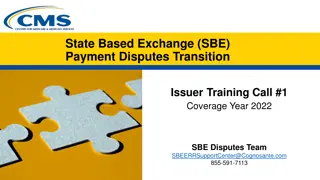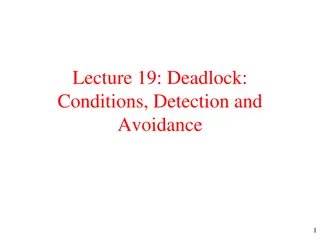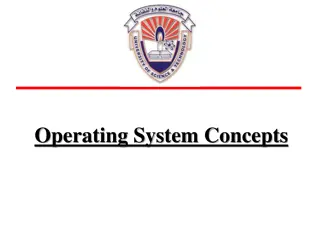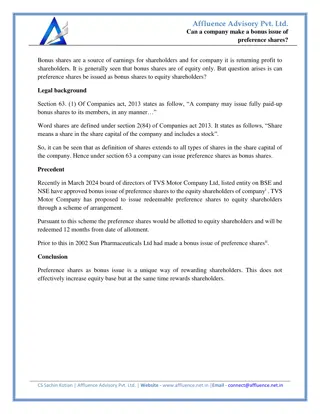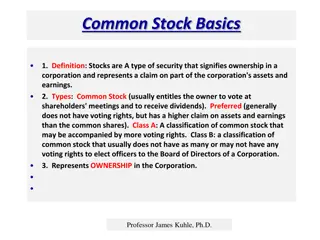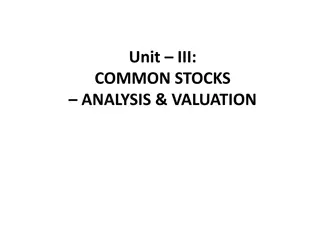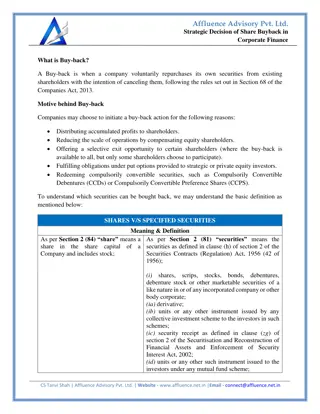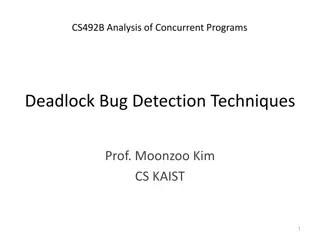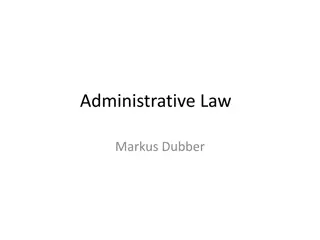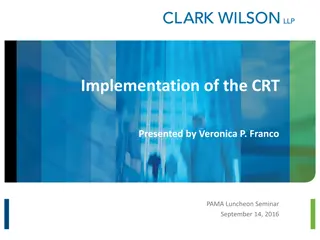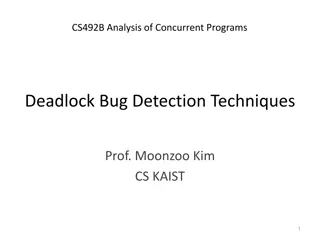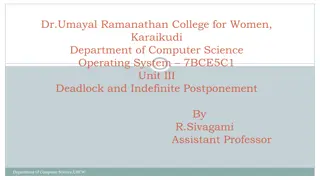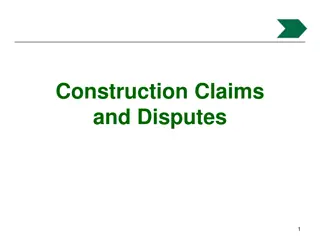Understanding Deadlock in Shareholders Disputes
Shareholders disputes leading to deadlock can be legally complex, potentially resulting in the winding up of a company. The concept of deadlock encompasses functional deadlock, based on the shareholders' inability to cooperate effectively, and irretrievable breakdown of trust and confidence. Differentiating between these two deadlock scenarios is crucial in determining whether a company should be wound up based on just and equitable grounds. Legal cases such as Chu v. Lau highlight the significance of deadlock situations in shareholder conflicts.
Download Presentation

Please find below an Image/Link to download the presentation.
The content on the website is provided AS IS for your information and personal use only. It may not be sold, licensed, or shared on other websites without obtaining consent from the author. Download presentation by click this link. If you encounter any issues during the download, it is possible that the publisher has removed the file from their server.
E N D
Presentation Transcript
UNPICKING DEADLOCKED COMPANIES Daniel Warents Sparsh Garg
Deadlock between Shareholders Section122(1)(g) of the Insolvency Act 1986 provides statutory basis for shareholders to petition the Court to wind up the company on grounds that it is just and equitable to do so . Deadlock between shareholders has been considered a just and equitable basis for winding up a company for over a 100 years. But it was not entirely clear what constituted deadlock justifying the winding up of a company......UNTIL NOW
Chu v Lau [2020] 1 WLR 4656 Two equal shareholders in a BVI holding company, Ocean Sino Limited. Ocean Sino was the sole shareholder of a Hong Kong subsidiary, PBM Asset Management Limited, which held a 49% interest in Beibu Gulf, a shipping and logistics company. The shareholders, through PBM, invest substantial funds to enable Beibu Gulf to purchase ships. The orders for some of the ships are cancelled with Beibu Gulf receiving substantial funds. One shareholder demanded repayment of the unused funding on the basis it was a loan. The other shareholder refused and denied that the funding that had been provided was even a loan.
The two deadlocks: functional deadlock The Privy Council held that Ocean Sino should be wound up. Clarified there are two distinct situations where a company may be wound up. First, a functional deadlock which arises where the shareholders inability to cooperate leads to paralysis. For example, 10 shareholders vote one way, and 10 shareholders vote another way and there is no mechanism to break the deadlock.
The two deadlocks: Irretrievable breakdown of trust and confidence Second, where there is an irretrievable breakdown in the relationship of trust and confidence between the shareholders. This is equity s response to a breakdown in the relationship of shareholders working together on the basis of mutual trust and confidence. Unlike functional deadlock , an irretrievable breakdown : Can only justify winding-up the company if it is a corporate quasi-partnership . Need not directly relate to the affairs of the company sought to be wound up. For example, one shareholder has an affair with the spouse of the other shareholder; see Lawrence v Lawrich Motors (1948) (2) SA 1029 (WLD) Does not necessitate a complete paralysis in the management of the company; see Chow Kwok Chuen v Chow Kwok Chi [2008] 2 SLR 362
Practice and Procedure Similar procedure to commence either type of petition. No written evidence need usually be initially filed in support of either petition at the time of presentation, and the petition usually stands as the statement of case. However, there are some important practical differences to consider at the outset: A shareholder cannot petition for the winding up of an insolvent company on the just and equitable ground but can seek unfair prejudice relief. A company subject to a winding up petition may only safely dispose of its property pursuant to a Court validation order; no such order is required where there is an outstanding unfair prejudice petition.
Establishing unfair prejudice or deadlock Unfair prejudice is different from both functional deadlock and irretrievable breakdown : It is not lightly to be assumed that an applicant who can prove the latter will equally be able to prove the former ; see Lau v Chu at [58]. Where there is a functional deadlock or an irretrievable breakdown , a court may wind up the company without the need to establish unfairness or prejudice to the petitioner; see Sim Yong Kim v Evenstar Investments Pte Ltd [2006] SLR 827 at [36]: ...the jurisdiction under [the just and equitable ground] may in some cases be broader than that under s 216. The most obvious example of this would be cases involving a deadlock between equal shareholders; whilst it may be difficult to attribute oppressive or unfairly discriminatory conduct on either party in such cases, the courts have nevertheless been ready to grant wind-up orders pursuant to their just and equitable jurisdiction: see eg, In re Yenidje Tobacco Company Limited (1916) 2 Ch 426 at 430. Nor, at least, as far as irretrievable breakdown is concerned is it necessary to only consider the conduct of the parties in connection with the management of the company s affairs, or prejudice to a shareholder in their capacity as a shareholder. A just and equitable winding-up order potentially provides a means of obtaining a no fault divorce.
Establishing unfair prejudice or deadlock Mere irreconcilable differences between shareholders do not justify unfair prejudice relief unfair conduct on behalf of the respondent and prejudice to the petitioner must be established; see McMillian v Toledo Enterprises International Pty Ltd (1995) 18 ACSR 603, 614; and Hawkes v Cuddy (No 2) [2009] 2 BCLC 427 at [108]. The unfair conduct must concern the company s affairs. Unfairness for these purposes arises out of two situations (O Neill v Phillips [1999] 1 WLR 1092, 1098-99) : A breach of duty or a breach of the company s memorandum, articles of association, or shareholders agreement; or Improper reliance on strict legal rights that equity would regard as contrary to good faith. The prejudice to the petitioner must be as a shareholder.
Establishing unfair prejudice or deadlock The same facts may justify both a just and equitable winding up order and unfair prejudice relief. For example, a deadlock may come about as a result of a wrong being committed in relation to the company s affairs. Normally a winding up order should not be sought where unfair prejudice relief is obviously the more appropriate. Where a respondent seeks to argue that a petitioner should pursue their petition under one head rather than the other, then such an objection should be raised by way of an application for a stay or strike out of the petition; see Kam Leung Sui Kwan v Kam Kwan Lai [2015] 18 HKCFAR 501 at 61.
Deadlock and Clean Hands In limited circumstances the conduct of the petitioner will be relevant to the determination of a winding up petition on the deadlock ground. Where the petitioner is the sole cause of the irretrievable breakdown, then the petitioner will not be entitled to a winding up order; see Chu v Lau at [64]. Part culpability is not sufficient to deprive a petitioner of a just and equitable winding up order if otherwise justified. If both the petitioner and the respondent are culpable but the company remains economically sound and the petitioner has engaged in particularly egregious conduct, then it may not be equitable to wind up the company; see Il v Yesilkaya [2021] EWHC 1695 (Ch) at [615]-[617].
Unfair Prejudice and Clean Hands In theory, there is no requirement that a petitioner should have clean hands in order to seek unfair prejudice relief; see Re London School of Economics Ltd [1986] Ch. 211 at 222A-C. In practice, misconduct on behalf of the petitioner may render the respondent s conduct not unfair or affect the remedy granted by the Court. However, similar to the just and equitable winding up jurisdiction, part culpability will not deprive the petitioner of a remedy altogether.
Remedies A winding-up order is an extreme remedy. It is one of last resort and exceptional ; see Fulham Football Club (1897) v Richards [2012] Ch 333 at [54]-[56]. However, if the grounds are made out for a just and equitable winding up order, then the burden is on the respondent to show the availability of some other remedy; see Lau v Chu at [20]. The respondent must show an alternative remedy that is sufficiently attractive to make it unreasonable to continue to seek a winding-up ; see Lau v Chu at [52].
Remedies A respondent is unlikely to be able to show that there is a sufficiently attractive alternative remedy where: The company s historic affairs call for an investigation by an independent liquidator. The respondent shareholders do not have the means or inclination to purchase the petitioner s shares. The petitioner s shares cannot be properly valued due to a lack of information as to the proper state of the company s affairs. Any other remedy will result in further litigation. The petitioner cannot realistically sell his shares to a third party at fair value; see, for example, Dyrud v Sea-Island Realities Limited AXAHCV 2020/0010, where the Court, considering Chu v Lau, found such a sale was not viable given the perennial state of the company s indebtedness . The Court cannot make a share purchase order on a just and equitable winding up petition; see Chu v Lau at [56] (equally applicable in England).
Remedies In contrast to a just and equitable winding up petition, a range of remedies are available to a Court if it grants an unfair prejudice petition. The most common remedy is an order requiring the respondent to purchase the petitioner s shares at fair value. Other remedies may include (amongst others): An order that the petitioner purchase the respondent s shares. An order requiring a respondent to restore misappropriated assets to the company. A court seemingly cannot make a winding up order on an unfair prejudice petition; see Re Full Cup International Trading Ltd [1995] BCC 682, 694C-E.
Conclusions: I have fallen out with my business partner -What do I do? Factors favouring a just and equitable winding up petition Factors favouring an unfair prejudice petition A lower threshold no need to establish fault A flexible remedy to suit your objectives for example, the company may be successful and you may wish to purchase your partner s shares A clean break if a share purchase order at a quantifiable value is granted no need to be involved in protracted investigations by liquidators A court may place less emphasis on the availability of alternative remedies once the petition is granted A broader range of potentially relevant material no need to establish the fall out was due to the management of the company s affairs Appointment of an independent liquidator particularly useful where you do not have information, are concerned about misappropriation, and lack resources to fund your own investigation Your partner lacks resources to buy you out Easier to compromise if your partner is willing and able to purchase your shares at fair value
